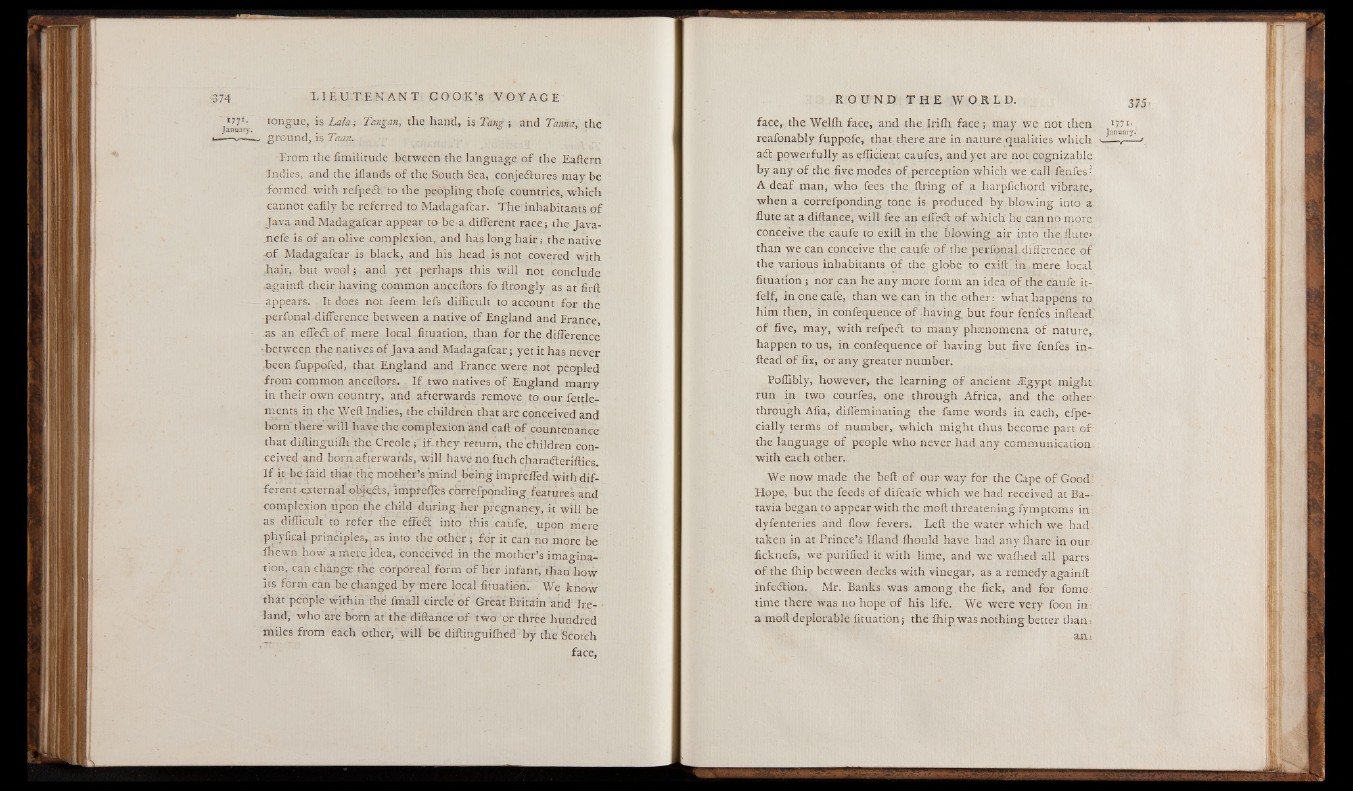
' 77'- tongue, is Lala; tangan, the hand, is Tam ; and Tama, the
January. 0 1 ■— <,— _ ground, is Taan, ,..
From the fimilitude .between the language of the Eaftern
Indies, and the iflands of the South Sea, conjectures may be
formed with refpeO/to the peopling thofe countries, which
cannot eafily be referred to Madagafcar. The inhabitants of
Java and Madagafcar appear- to be a different race; the Java-
nefe is of an olive complexion, and has long hair j the native
-of Madagafcar is black, and his head is not covered with
.hair, but wool; and yet perhaps this will not conclude
.a-gainft their having common ancellors fo ftrongly as at firft
appears. It does not feem lefs difficult to account for the
-perfonal-difference between a native of England and France,
.as an effect of mere local flotation, than for the difference
•between the natives of Java and Madagafcar; yet it has never
been fupppfed, that England and France were not peopled
from common anceftors. If two natives of England marry
in their own country, and afterwards remoye to our fettle-
rnents. in the Weft Indies, the children that are conceived and
born there will have the complexion and caft of countenance
that diftinguiifh the-Creole ;' if-they return, the children conceived
and born afterwards, will have no.fuch charadtenftics.
If it be Paid that the mother’s mind being imprefled with different
.external objeifts, jmpfefles correfponding features and
complexion upon the child during her pregnancy, it will be
as difficult to refer the effeeff into this .caufe, upon mere
phyftcal principles, ras into the other; for it can no more be
fltewn.how amefefjdea, conceived in the mother’s imagination,
can change'the corporeal'form of hér infant, than how
Its form can be changed by mere local fituation. We know
that people within the fmall circle of Great Britain and Ire-
land, who are born at the diftance of two or three hundred
miles from each other, will be diftinguifhed by the Scotch
face,
face, the Welfh face, and the Irifh face ; may we not then 1771 ■
reafonably fuppofe, that there are in nature qualities which vi—s—
adl powerfully as efficient caufes, and yet are not cognizable
by any of the five modes of perception which we call fenfes ■
A deaf man, who fees the firing of a harpfichord vibrate,
when a correfponding tone is produced by blowing into a
flute at a diftance, will fee an effect of which' he can no more
conceive the caufe to exift in the blowing air into the flute»
than we can conceive the caufe of the perfonal difference of
the various inhabitants of the globe to exift in mere local
fituation; nor can he any more form an idea of the caufe it-
felf, in one cafe, than we can in the other: what happens to
him then, in confequence of haying but four fenfes inftead.
of five, may, with refpedt to many phenomena of nature,
happen to us, in confequence of having but five fenfes inftead
of fix, or any greater number.
Eoffibly, however, the learning of ancient iEgypt might:
run in two courfes, one through Africa, and the other-
through Alia, difleminating the fame words in each, efpe-
cially terms of number, which might thus become part of~
the language of people who never had any communication:
with each other.
We now made the beft o f our way for the Cape of Good-
Hope, but the feeds of difeafe which we had received at Batavia
began to appear with the mod threatening fymptoms in .
dyfenteries and flow fevers. Left the water, which we had,
taken in at Prince’s Ifland fhould have had any fhare in our
ficknefs, we purified it with lime, and we wafhed all parts
of the fhip between decks with vinegar, as a remedy againft
infection. Mr. Banks was among, the fick, and for fome.
time there was no hope of his life. We were very foon in
at moft deplorable fituation; the fhip was nothing better, than!
am